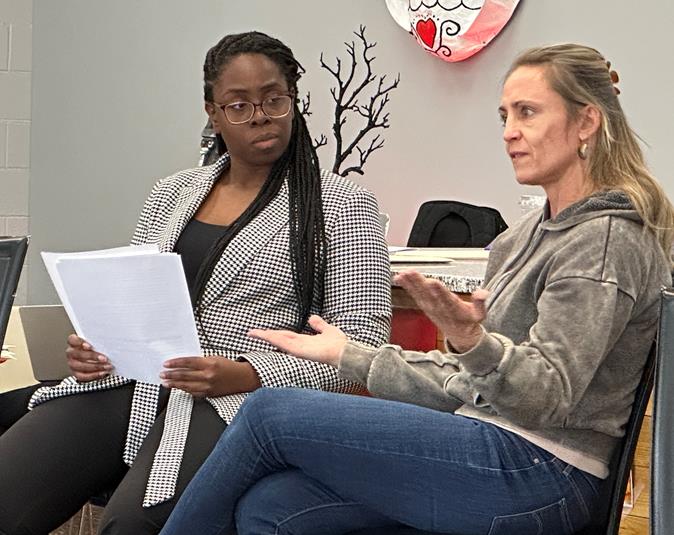December 20, 2024
Applied learning experience explores public health crisis management

Some may remember the 1990s fashion, music, movies or the rise of the internet. Justin Kastner and Jason Ackleson took participants back to the iconic decade to learn about the 1993 Milwaukee cryptosporidiosis outbreak, the largest waterborne disease outbreak in U.S. history, an event which many overlook when thinking about the 1990s.
Participating students and faculty gathered in Council Grove for the 42nd Frontier Field Trip Nov. 1-2. This trip, "A Public Health Predicament for the People and the President of the United States: What Would You Say?" provided an immersive experience blending history, science and critical thinking for participants. This year's trip was inspired by the 1993 Milwaukee cryptosporidiosis outbreak and provided the experience of confronting a simulated public-health crisis.
The 1993 Milwaukee cryptosporidiosis outbreak was caused by a microscopic parasite in the city's water supply. As a result, more than 400,000 residents became ill. Taking place in "Grunge-town, USA," students faced similar challenges as public officials, health experts and residents did in 1993.
The "players" took a variety of different roles including community members, hospital workers, officials in the local and federal government and more. As the outbreak progressed, updates were provided as Kastner's colleague, and K-State MPH alumna, Del'Sha Roberts, K-State Staley School of Leadership, played the role of Oprah Winfrey, interviewing the participants. Anna Pees, an alumna of K-State College of Veterinary Medicine, also participated. Pees, who holds a DVM and MPH from K-State, served as the field trip's subject-matter expert. She helped the students understand the environmental and public health aspects of the outbreak. Other organizational assistance was provided by MPH students Brian Weiderman and Rachael Warhurst Weiderman. Brian and Rachael helped Kastner and Roberts craft the "script" for the weekend. Ackleson, a scholar of political science and international relations, fittingly played the role of Bill Clinton, the 42nd President of the United States.
Participants came from across campus and various majors. Students who went on the trip included: Kenna Hiebert, undergraduate student in public health, concurrently completing the Master of Public Health program; Alexa Heseltine, undergraduate student in medical microbiology and concurrently completing the Master of Public Health program; Lily St. Jacques, undergraduate student in public health. Students in the Master of Public Health program: Nathan Schaller, Lesley Hayward, McKenzie Ghrist, Kelli Shoemaker, Abdoulaye Ouologuem, Cristina Alamos, Olivia Shruck, Brian Weiderman, Rachael Weiderman, Jordan Vail, Allyson Barksdale and Carissa Jonak. Three students from the food science department participated, Yara Abi Nakoul and Mariana Parades Rivera, master's students and Rashmi Gaikwad, Ph.D. student.
"We had a lot of scenarios to go through that included all of the details of what was happening in Grunge-town," Schaller said. "From there we had a short break with discussion groups followed by lunch."
During the trip, groups crafted and delivered press conferences to address public concerns and combat misinformation. The group analyzed simulated water contamination data and developed potential causes to replicate real-time epidemiological investigations. Participants that were Grunge-town citizens reported symptoms of water contamination and interacted with those portraying health officials. This gave participants the opportunity to learn about the spread and diagnosis of an outbreak.
"It was a good experience to be with other peers to be learning interdisciplinary information while taking a break from school," Heseltine said. "We are expanding our knowledge of public health while collaborating with like-minded individuals. Getting to do another Frontier Field Trip is always interesting and each one brings something new. It's always unique to learn about public health and talk about how you can use history to contribute to ongoing public health issues that are pertinent today."
"As with all Frontier Field Trips, we designed the weekend to help students feed their intellectual curiosity while growing in multidisciplinary breadth," Kastner said. "Through this particular trip, the students 're-lived' what disease investigators, technology innovators, regulatory officials, and even the president of the United States faced during one of the most culturally and politically dynamic decades in American history."
The immersive and interdisciplinary nature of the trip not only challenged students to think critically about real-world problems but also fostered personal and professional growth. For participants like Schaller, the hands-on approach and collaborative environment were highlights of the experience.
"The experience as a whole was amazing," Schaller said. "I thrive off of interactions with peers and truly appreciate that style of learning. I am very much a person that learns from doing over studying and putting things into practice. Communication and collaborative teamwork is something I will continue to use as I move forward in my life and career."
